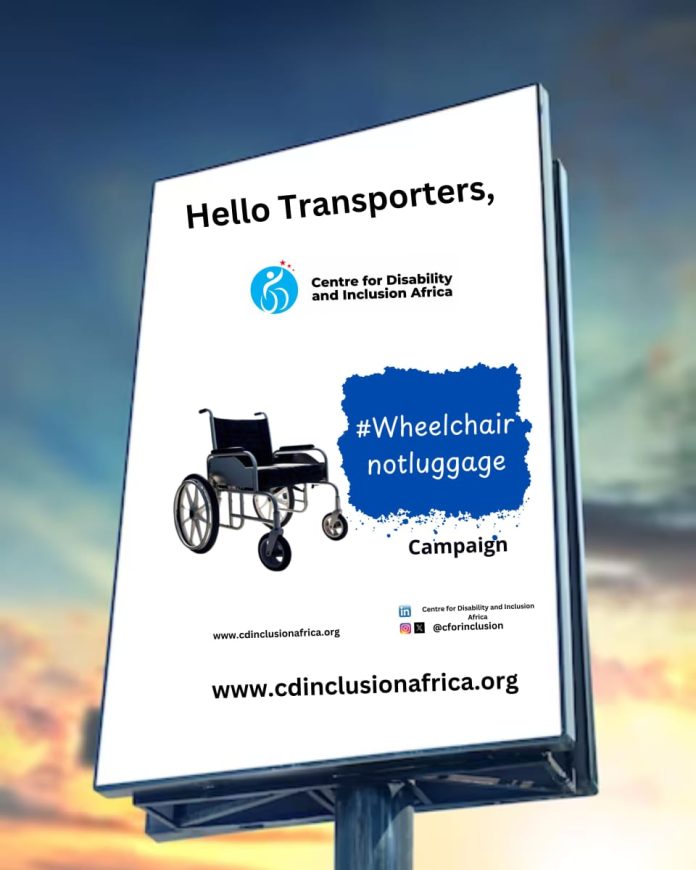In a powerful bid to address the widespread human rights abuses faced by people with mobility challenges, the Centre for Disability and Inclusion Africa (CDIA) has launched the bold and much-anticipated #WheelChairNotLuggage campaign. The initiative, which officially kicked off in Lagos, seeks to eradicate the persistent and discriminatory practices faced by wheelchair users in public and private transportation across Nigeria.
The launch event, attended by key stakeholders, disability advocates, and members of the public, put a spotlight on the widespread mistreatment that wheelchair users endure daily in Nigeria’s transport sector. From outright refusals to transport people with mobility aids to the unjust charging of extra fees for wheelchairs as though they were luggage, the campaign is a direct response to the growing demand for inclusivity and respect for the rights of persons with disabilities.
Yinka Olaito, the Executive Director of the Centre for Disability and Inclusion Africa, made a stirring statement during the event, emphasizing that the #WheelChairNotLuggage campaign is long overdue. Olaito revealed that wheelchair users have been forced to suffer in silence for far too long, enduring neglect, ill-treatment, and in some cases, illegal charges from transporters, including buses, taxis, and even airlines.
“For too long, individuals who rely on wheelchairs for mobility have been treated as though they are a burden,” Olaito said. “They have been subjected to neglect, mistreatment, and even unjust fees, simply for the fact that they use a wheelchair. This campaign is our demand for an urgent reorientation and behavioral change among transport providers.”
The issue at hand is not just one of inconvenience or discomfort; it is a fundamental violation of human rights. Olaito pointed to the Discrimination Against Persons with Disabilities (Prohibition) Act of 2018, which unequivocally forbids such discriminatory practices. “Wheelchairs are personal mobility devices, not luggage,” he stated. “Refusing to transport someone with a wheelchair or treating it as excess baggage is a blatant violation of their rights, and transporters who engage in such actions are liable to criminal prosecution under Nigerian law.”
The #WheelChairNotLuggage campaign calls for an urgent overhaul of attitudes within Nigeria’s transportation industry. It demands that transport providers—whether they operate buses, taxis, or airlines—undergo sensitivity training and learn to treat persons with disabilities with dignity and respect. Additionally, the campaign urges transportation association leaders to take proactive steps in educating their members about the importance of complying with the law and creating a more inclusive environment for all passengers, regardless of their physical abilities.
“This is just the beginning,” Olaito declared, as he outlined plans for continued advocacy and outreach efforts. “We will not stop until the voices of those with disabilities are heard, and the discriminatory practices that have plagued the transport sector are eradicated. We will use every available platform to amplify this message until equitable treatment becomes the norm and not the exception.”
The campaign also calls on various stakeholders in the disability inclusion space, including government agencies, civil society organizations, and international partners, to join forces and advocate for fairness and justice for persons with disabilities. The #WheelChairNotLuggage movement is a reminder that the fight for disability rights is not just about access to physical spaces but also about challenging the societal attitudes that perpetuate discrimination and exclusion.
As the campaign gathers momentum, it is expected to spark widespread conversations around disability inclusion, legal enforcement, and the urgent need for change in Nigeria’s transport systems. The goal is clear: to ensure that every individual, regardless of their mobility status, has equal access to transportation and the right to live without fear of mistreatment or discrimination.
For too long, persons with disabilities have been relegated to the margins of society, but with campaigns like #WheelChairNotLuggage, that narrative is shifting. This is not just a fight for accessibility; it is a fight for dignity, justice, and human rights for all.
As the Centre for Disability and Inclusion Africa looks ahead, they are committed to driving change, ensuring that this campaign sparks a ripple effect across Nigeria and beyond—creating a world where mobility aids are recognized for what they truly are: tools for independence, not burdens to be ignored or mishandled.


